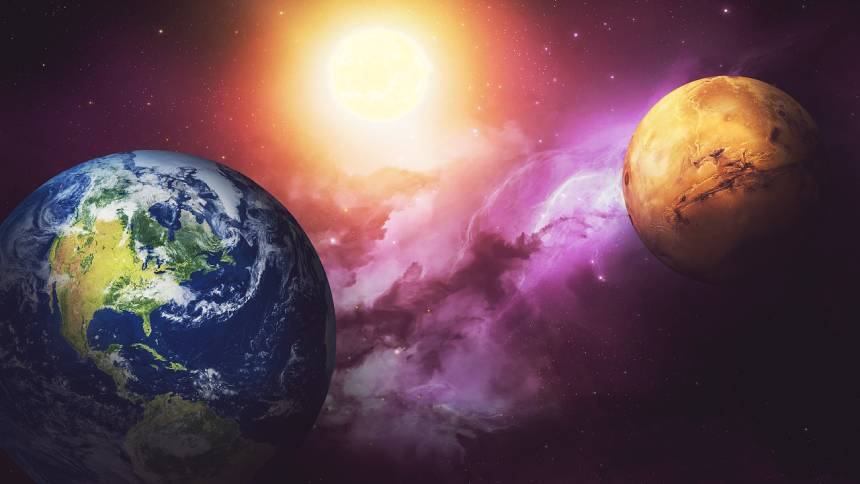Mars at this time can be said to be a water sphere. If calculated according to the ratio of the volume of water to the planet, the proportion of water on the earth today is not as high as that on Mars at that time. Why is this the case? In fact, in the first hundreds of millions of years of the formation of the solar system, the light emitted by the sun was slightly stronger. If Mars was in its current orbit or nearby at that time, then the position of Mars is actually exactly in the center of the habitable zone of the solar system. Just like the current position of the earth, and there were comets in the solar system at that time, these small celestial bodies carrying a lot of ice and snow kept hitting Mars, bringing it a lot of ice and snow to melt into liquid water, so the surface of Mars at that time had a lot of water.
The research team believes that these things happened in the 100 million years after the formation of Mars, and these comets also carried organic molecules that are biologically important for the formation of life. These molecules formed amino acids and proteins in the ocean of primitive Mars, creating The first life, these are likely to be the first life forms in the entire solar system. Is it earlier than the appearance of life on earth? Yes, because when life began to form on Mars 4.5 billion years ago, the Earth experienced a major event in the early stages of its formation. It was a planet the size of Mars that hit the earth, causing the earth to return to a lava state, and it took hundreds of millions of years to stabilize, so the conditions for life to form on the earth during this period were not available.
Therefore, life was formed on Mars earlier than life on Earth! So how did the research team know that Mars had the conditions for life to form 4.5 billion years ago? In fact, through a Martian meteorite with a history of billions of years, it is believed that this meteorite was once part of the original crust of Mars. By analyzing its composition density and other information, we can understand the condition of the surface of Mars at that time. So since there used to be life on Mars, and there was a huge ocean, why did it all disappear? The reason is actually due to the structure of Mars. Due to the small mass of Mars, there are relatively few internal activities, and Mars has no large satellites, which makes it gradually cool inside, and the magnetic field gradually disappears, unable to provide protection for the atmosphere of Mars.
The strong solar wind eventually swept through the atmosphere of Mars, and a large amount of water on the surface was gradually evaporated and dissipated into space. The surface environment of Mars was gradually no longer suitable for life, and finally became the scene of a desert today. Martin Bizzarro, a professor at the Center for Star and Planetary Formation at the University of Copenhagen, said: “Plate tectonics on Earth erased all evidence of what happened in the first 500 million years of Earth’s history. These plates are constantly moving and destroying the interior of the planet. In contrast, Mars has no evidence.” Plate tectonics, so the surface holds the earliest record of Mars’ history.”
